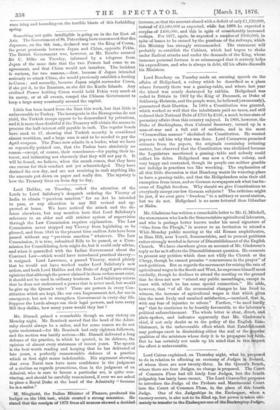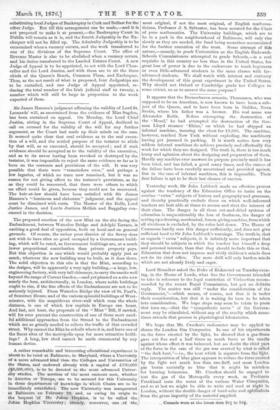Lord Cairns explained, on Thursday night, what he proposed to
do in relation to effecting an economy of Judges in Ireland, of whom there are now twenty-three. In the Queen's Bench, where there are four Judges, no change is proposed. The Court of Common Pleas had till lately four Judges, but the fourth judgeship has lately been vacant. The Lord Chancellor proposes to introduce the Judge of the Probate and Matrimonial Court into the Court of Common Pleas, in the place of this fourth Judge. One of the Judgeships in the Exchequer, when a vacancy occurs, is also not to be filled up, but power is taken ulti- mately to transfer to the Exchequer one of the Bankruptcy Judges,
substituting local Judges of Bankruptcy in Cork and Belfast for the other Judge. But till this arrangement can be made,—and it is not proposed to make it at present,—the Bankruptcy Court in Dublin will remain as it is, and the fourth Judgeship in the Ex.. chequer will not be filled up. The Admiralty Judgeship is to be economised when a vacancy occurs, and the work transferred to one of the divisions of the Supreme Court. The office of Revenue Master is also to be abolished when a vacancy occurs, and his duties transferred to the Landed Estates Court. A new Judge of Appeal is to be appointed, to act with the Lord Chan- cellor and the Lord Justice, and with them are to sit the three chiefs of the Queen's Bench, Common Pleas, and Exchequer. "Thus, as the net result of what is proposed, four Judgeships are to be curtailed, and one Judge of Appeal appointed, re- -diming the total number of the Irish judicial staff to twenty, a number which will still be large in proportion to the work .expected of them.



































 Previous page
Previous page